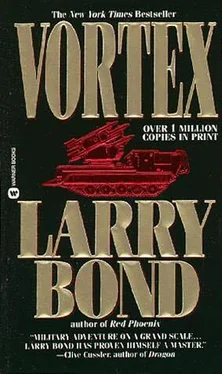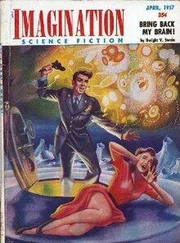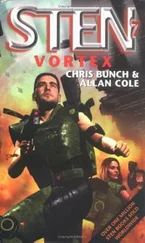“I will not tolerate any further failure. “
The general nodded stiffly.
“You may rely on me, Mr. President. The
Twentieth Cape Rifles will be annihilated.”
He clasped his hands behind his back to hide the fact that they were shaking.
Marius van der Heijden stared down at the map-covered table to conceal his own growing uncertainty. Cuba’s communists and the capitalists of the
West might not have to work very hard to destroy the Afrikaner nation.
Karl Vorster seemed only too willing to do their work for them.
HEADQUARTERS, 44TH PARACHUTE BRIGADE
REACTION FORCE, NEAR VILJOENSDRIF, SOUTH OF
JOHANNESBURG
The setting sun cast long, red-tinted shadows over the orange groves and green, irrigated lawns surrounding Jan Bode’s whitewashed two-story farmhouse. Flocks of bright-plumed birds circled overhead through a cloudless sky before landing along the banks of the nearby Vaal River.
Faint traces of dirty-gray smoke lingered on the western horizon-visible signs of Vanderbij1park’s iron and steel plants and clear proof that not all of South Africa was a pastoral and peaceful land.
But there was more than enough evidence of that closer to hand.
Three hundred South African paratroops in full combat gear lounged beside the sixteen helicopters dotting the farmhouse’s open lawns. Assault rifles, boxes of ammunition, and fuel drums were stacked under the brown-and-green camouflage netting covering each helicopter. Mechanics and air crews in grease-stained overalls clustered around several of the helicopters-performing routine maintenance work on Puma and Super Frelon troop transports.
Maj. Rolf Bekker paused in the farmhouse door, waiting for his eyes to adjust to the sunlight. He nodded slowly to himself, glad to see his men seizing every opportunity for both rest and needed repair work. They were all combat veterans, and veterans knew the value of time.
He stepped out onto the lawn, wincing slightly at a momentary twinge in his left leg. The doctors had assured him that he’d made a full recovery from the wounds he’d received during the battle for Keetmanshoop Airfield. Right. Knowit-all bastards.
Bekker spotted the man he’d been looking for and instantly forgot all about the pain from his old wounds.
“Sergeant!”
Staff Sergeant Roost hurried over from the pile of supplies he’d been inspecting.
“Sir?”
“Find Captains Recheck and der Merwe and tell them I want to see them at the farmhouse in fifteen minutes.”
“Yes, sir. ” The short, wiry noncom turned to go and then turned back.
“Are we going to see some action soon, Major?”
Bekker nodded.
Roost smiled, a fierce, quick grin.
“Do we kill Americans or Cubans this time?”
“Neither, Sergeant. ” He shook his head grimly.
“This time we hunt our own kind.”
If the thought of killing fellow South Africans bothered Roost, he certainly didn’t let it show on his face. Instead, he just touched his hand to his beret in a casual salute and moved off to obey his orders.
Bekker stood motionless for several moments, watching as the sergeant headed away in search of his two company commanders. At least this once, he thought, Pretoria’s orders were clear and concise. The men and helicopters of the Parachute Brigade’s Reaction Force were to find, attack, and destroy
Commandant Kruger and his traitorous 20th Cape Rifle battalion.
And Maj. Rolf Bekker always obeyed his orders.
DECEMBER 14-FORWARD HEADQUARTERS, CUBAN EXPEDITIONARY FORCE, POTGIETERSRUS
Gen. Antonio Vega tried not to let his anger and frustration show. It was important that his staff, and all his men, think that he was in absolute control, but inside, his inner drive was locked in its own private war with his patience. Damn it, they had to get moving again!
Castro’s latest message lay on his desk, an unwelcome reminder of his progress. The tone was encouraging enough: The presence of the Western imperialists shows that the South Africans must be on their last legs, otherwise their masters would not have to rescue them. Press on to victory!
Cuba has every confidence in you.
Press on with what? Despite an apparently overwhelming victory at
Potgietersrus more than two weeks before, his offensive had ground almost to a halt. The Afrikaners were proving unexpectedly resilient. And his own problems seemed to multiply with every passing day.
His own slow progress was especially galling in the face of the Americans’ removal of South Africa’s nuclear option and their successful landing at Cape Town. He had to move fast-his window was closing.
The loss of South Africa’s nuclear capability had not overly helped him, since his tactics of dispersion and civilian masking had worked well. It simplified his movement plans, but you had to be moving for that to matter.
His First Brigade Tactical Group had begun squandering the first fruits of its triumph in the first hours after its attack. When Colonel Mahmoud’s
Libyan motorized rifle battalion entered the city, it had stumbled into what its poorly trained, poorly paid soldiers regarded as their own private treasure trove. Hundreds of homes abandoned by their white owners-homes packed with portable radios, television sets, and stereo systems. Stores and shops crammed with rich foods, automobiles, and other luxury items.
Even with assistance from Cuban troops following close behind, it had taken
Mahmoud precious hours to bring his rioting, rampaging men to heel.
Then, when Vega’s troops were finally able to resume their drive south, they’d run headlong into more Afrikaner troops hurrying north-the first significant numbers of tanks and guns to arrive from the stalemated
Namibian front. So what should have been a cakewalk had turned into a bloody, bruising, two-day fight that left both sides exhausted and about where they’d started from. Even worse, the battle had consumed the Cuban tactical group’s carefully hoarded stockpiles of ammunition and fuel.
Supply. Vega rubbed his temples, feeling the start of another pounding headache. He’d always known that logistics would be his largest problem-especially for the First Brigade Tactical Group. He had a
Soviet-supplied airhead at Pietersburg, but cargo aircraft alone couldn’t carry the massive quantities of diesel fuel, ammunition, and spare parts a modern mechanized army needed to keep moving and fighting. Most of the supplies he needed had to go by sea to Maputo, then northward along the railroad to Rutenga, and from there south into South Africa-an overland distance of more than one thousand kilometers.
The distance alone presented his supply officers with an almost insoluble problem. The constant hit-and-run attacks on his truck convoys and freight trains only made things worse. Not only were white South African commandos attacking his columns, but breakaway guerrillas from the ANC and other black groups were making separate raids. He smiled grimly. It was probably the first time that the two sides had ever agreed on anything.
Vega remembered the early days of the offensive, when his men had been welcomed by villages they passed with gifts of food and beer. Now they got rocks if they were lucky, bullets if they were not.
He scowled. Whether he liked it or not, the First Tactical Group’s days of easy victories and rapid advances were over. The supplies it needed to go back on the offensive were coming in steadily-but only very slowly.
And until he had enough fuel and ammunition, his northernmost attack column was reduced to simple skirmishing-company-strength probes of the
Afrikaner defenses at Naboomspruit, fifty kilometers south of
Potgietersrus.
Читать дальше












